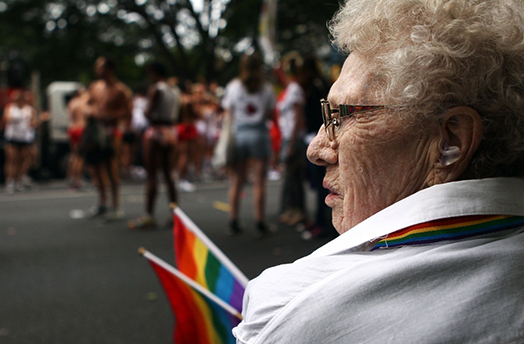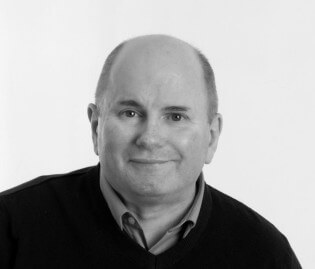‘I’m afraid of being abused, but I won’t hide any longer’ — LGBT senior
Human Rights Commission
As Baby Boomers age, LGBT seniors will increasingly need access to healthcare many feel is inaccessible and unwelcoming to them.
‘I’m afraid of being abused, but I won’t hide any longer’ — LGBT senior
by Lindsey Peterson
Lindsey Peterson/MEDILL
Data from LGBT Aging Center
LGBT people 50 and over report victimization in their lifetime.
The Generation Gap
Resources for LGBTQ youth are surging.
As political, social and cultural attitudes shift, young LGBTQ people may have more support than ever. But many older LGBT adults worry about the momentum failing to capture the needs of seniors in their community.
“There is a big focus on the youth, which is great, but I think a lot of people lose sight of the fact that this goes across an entire lifespan. Often we’ll hear, ‘Wow, you really opened our eyes to the fact that people are aging and still dealing with this.’ There is a big focus on youth, but what we’d like to do is open people’s eyes to the entire LGBT lifespan.” – Eric Vironet, LGBT program director, West Suburban Senior Services.
Growing up in an era that classified homosexuality as a mental illness, and brutality and discrimination were tolerated, some LGBT seniors fear their struggles of the past will follow them into old age.
Eric Vironet recalls one senior telling him, “The kids that tormented me are still there, they’re grown up now and they’re seniors just like us. So when we go to a nursing home they’re going to be there, waiting for us.”
Vironet is the LGBT program director at West Suburban Senior Services in Forest Park. He leads a weekly support group for LGBT seniors.
For the next 17 years, 10,000 baby boomers will turn 65 years old every day; and by 2030, 18 percent of the U.S. population will be over 65, according to a 2010 Pew Research Center report.
While solid numbers are hard to identify, a report released by the National Gay and Lesbian Task Force Policy Institute, “Outing Age 2010,” estimated 5-to-10 percent of those baby boomers identify as LGBT.
That means as many as 2 million to 7 million gay and lesbian seniors are entering a healthcare system that may not be ready for, or welcoming to, their needs.
“To have somebody come into your home when you’re sick, or a homemaker help with daily living activities, imagine the fear of ‘is that person going to accept who I am? Do I have to hide who I am?’” Vironet said.
“It’s a great scare. So they’re afraid they’re going to have to go back into the closet if they go to a nursing home or have someone coming into their home providing them care.”
Anne Marie Lane is a 55-year-old lesbian living in Berwyn. She attends Vironet’s support group regularly and fears a neglectful healthcare system.
Lane said she was out as a lesbian throughout her childhood and into her teens, but abuse from the West Side neighborhood kids led Lane to enlist in the military and hide her sexuality.
“I was in a community of openly — more or less — gay people in the Army,” Lane said. Within this community, she was encouraged to find a male partner – a “beard” she said.
Someone who could pretend to be her spouse in order to protect her from the abuse she was experiencing from other soldiers. She had been gang-raped while enlisted.
Despite the ruse, two years into service, Lane said, “Because I was in a highly politically charged environment, I think somebody’s trumped a card and outed me.”
Lane was honorably discharged, and said while the military has not confirmed that her discharge was the result of her sexuality, Lane is sure it was.
Lane would go on to marry her “beard” when they left the military. They had one child together, whom they put up for adoption. Lane was unaware at the time that her husband was also gay. He would later commit suicide.
Lane remarried once more and is now in the process of getting a divorce.
Lane was cautious about navigating the current healthcare system as a closeted lesbian. While trying to hide her sexuality, doctor visits could feel more like a grilling, or an unwanted reveal of her hidden sexuality.
“I try not to go to an OB-GYN because they always ask me questions that identify my sexuality, like ‘how many abortions, how many partners in the last six months, how many miscarriages?’ you know. And as you progress it becomes apparent that I have a sexual preference and there’s a judgment that I perceive,” Lane said.
And research seems to support this fear. In the Outing Age 2010 report, researchers said, “Because many LGBT people fear discrimination or have had past negative experiences with healthcare providers, they may avoid disclosing important experiences with healthcare providers, they may avoid disclosing important details of their health and risk factors to clinicians or may avoid health care altogether.”
Lane recalls “horrific” doctor’s visits that were as physically painful as they were emotionally traumatizing if a doctor discovered she was gay.
“They assume I have all of these diseases,” Lane said. “I’ve been checked so many times for STDs and AIDS and HIV, and there’s no reason, even if I’ve said I haven’t any partners, the VA will check anyway.”
The Outing Age 2010 report confirmed that Lane’s experience is not unique.
“LGBT older adults … spent much of their earlier adults lives during an era when medical and mental health professionals routinely stigmatized homosexuality and gender nonconformity as illnesses meriting harsh interventions,” the report says.
While emerging LGBT-specifc healthcare is an answer to some problems, ongoing education and experience with LGBT elders, Lane said, should be a priority to have a more integrated system.
In ongoing research by the Task Force/NCTE National Transgender Discrimination, one study said “one-quarter of respondents age 65 and over reported that they had delayed or avoided needed or preventative medical care because of disrespect or discrimination in medical settings.” In California, 11 percent of transgendered respondents said they were refused care because they were transgendered.
A 2010 Pew research report said “despite the reputation they gained as young adults for favoring alternative lifestyles, Baby Boomers today are less accepting than younger Americans of same-sex couples raising children, unmarried couples living together and other non-traditional arrangements.”
That lack of federal recognition of gay marriage leaves LGBT seniors and their partners at a financial disadvantage. LGBT elders, especially women, are more likely to find themselves in poverty.
The Chicago Task Force on LGBT Aging reports that more than 8 percent of LGBT elders in Chicago have an annual income under $10,000, putting them below the poverty line.
Female same-sex couples are twice as likely to be in poverty as heterosexual couples – an estimated 9 percent. About 5 percent of male same-sex couples live in poverty. In heterosexual couples, that number is 4.6 percent.
“Right now, there’s no federal marriage recognition for LGBT folks,” Vironet said. “So even if you have a civil union, you won’t receive Social Security benefits if they pass away, along with a lot of the social benefits we take for granted for seniors.”
End-of-life decisions for single and partnered LGBT people are especially difficult to arrange. Without legal recognition, hospital visitation and critical health decision-making may not be granted to same-sex partners.
“I just want to be able to do that spiritual vows commitment and I want to be able to help them and them help me with end-of-life decisions,” Lane said.
“I have some really aggressively controlling relatives and even if I had a partner and had it all worked out with them, I have relatives that would come in and say ‘No, no, we’re blood, we decide.’ And I’ve seen it happen in my family.”
Vironet said West Suburban Senior Services hopes to alleviate some of these burdens.
“There’s the need to create power-of-attorney and legal documents to duplicate what marriage would normally provide. A lot of time people don’t have access to free legal services, it’s expensive sometimes to get access to these documents,” Vironet said, whose group is having a lawyer come in to help with documents next week.
“Some of these seniors do not have the best family relationships. Perhaps they’ve been rejected by families and don’t have normal social support like children or close family members — not in every case of course – but maybe an increased social isolation, which doesn’t help when you’re trying to deal with the difficulties of aging.”
Members of Vironet’s group have discussed designating each other as decision-makers for end-of-life issues in absence of trusted family members, Lane said.
The LGBT senior program at West Suburban is just about to celebrate its first birthday. Vironet said the group started with about 15 seniors. Now it has about 60 members.
Lane decided to start coming back out as a lesbian last fall. She said after she spoke with a transgendered senior in the West Suburban group, she realized, “it wasn’t too late for me.” It was around March, she said, that she opened up to those closest to her.
“I would love to have a partner, I’d love to be able to be married, I’d love to have the right for DNR [Do Not Resuscitate order] for my partner or to give my partner that right. Which is what we’re fighting for legally,” Lane said.
“But, I’ve already said very clearly, and it applies to everything, I spent 30 years hiding, I’ve been very clear I’m not going to hide. I’m going to face every fear. And yes, I’m afraid of being abused or neglected if I end up alone in a nursing home. If people are going to be ignorant, they’re going to be ignorant, I just cannot hide any longer.”
©2001 – 2014 Medill Reports – Chicago, Northwestern University. A publication of the Medill School. June 06, 2013






2 Comments